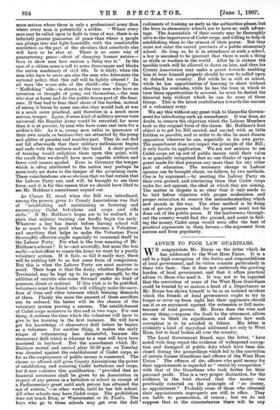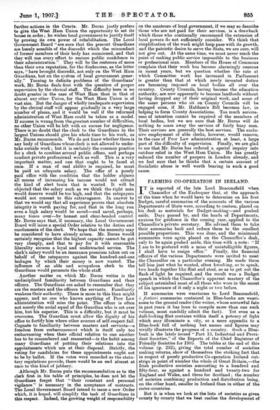ADVICE TO POOH LAW GUARDIANS.
WE congratulate Mr. Burns on the letter which he has addressed to the West Ham Union. It is a call to a high conception of the duties and responsibilities of local government, and its virtue consists particularly in these two facts : that it does not underrate the growing burden of local government, and that it offers practical advice to those who need it. It was not to be expected that the conviction of some of the West Ham Guardians could be treated by so zealous a head of a Department as Mr. Burns has shown himself to be as an isolated incident which the friends of local government ought to try to forget or cover up from sight lest their opponents should use it as an argument against the extension or full main- tenance of local powers. Mr. Burns does the wise and strong thing,—exposes the fault to the uttermost, allows no one to blink its significance, and shows how such corruption is to be avoided in future. His letter is evidently a kind of encyclical addressed not only to West Ham, but to local bodies all over the country.
The Local Government Board, says the letter, "have noted with deep regret the evidence of widespread corrup- tion and disregard of public duty which have been dis- closed during the proceedings which led to the conviction of certain former Guardians and officers of the West Ham Union." The offence of the officers who paid money for their appointments is regarded as "venial by comparison " with that of the Guardians who took bribes for their personal profit. This is a very proper distinction, for the evidence in the trial showed that the money was practically extorted on the principle of "no money, no appointment." Probably some of those who obtained their appointments improperly are still in office. They are liable to prosecution, of course ; but we do not suppose that in the circumstances there will be any further actions in the Courts. Mr. Burns justly prefers on the amateurs of local government, if we may so describe to give the West Ham Union the opportunity to set its' those who are not paid for their services, is a drawback house in order ; he wishes local government to justify itself which those who continually recommend the extension of by proving its own power of rehabilitation. The Local local powers do not sufficiently consider. We think that Government Board "are sure that the present Guardians simplification of the work might keep pace with its growth, are keenly sensible of the discredit which the misconduct and the patriotic desire to serve the State, we are sure, will of former members of their body has occasioned, and that not give outs At the same time, we must never reach the they will use every effort to restore public confidence in point of making public service impossible to the business their administration." They will be the restorers of more or professional man. Members of the House of Commons than their own reputation, for the disclosures, as the letter complain that their work has become alarmingly onerous says, "have brought discredit, not only on the West Ham in recent years, but we question whether the rate at Guardians, but on the system of local government goner- which Committee work has increased in Parliament ally." Turning to definite problems of the Guardians' is greater than that at which newly invented duties work, Mr. Burns deals first with the question of proper are becoming imposed on local bodies all over the supervision by the clerical staff. The difficulty here is no country. County Councils, having become the education doubt greater in the case of West Ham than in that of authority, are now apparently to become landlords without almost any other Union, for the West Ham Union is of having dropped any of their original work, and some of vast size. But the danger of wholly inadequate supervision the same persons who sit on County Councils will be by the clerical staff will appear gradually in a very large engaged soon, if Mr. Haldane's Bill becomes law, in number of places, and it would be well if the reformed helping to form County Associations. Too much serious- administration of West Ham could be taken as a model. ness of intention cannot be required of the members of If success is wrung from the greatest number of difficulties, local bodies, but we are sure that Mr. Burns will do no other Union will be left with an excuse for negligence, nothing to scare away the services of fairly busy men. There is no doubt that the clerk to the Guardians in the Their services are generally the best services. The exclu- largest Unions should give his whole time to his work, as sive employment of able clerks, however, would remove, Mr. Burns recommends. We do not know whether there is in the case of Poor Law administration at least, a large any body of Guardians whose clerk is not allowed to under- part of the difficulty of supervision. Finally, we are glad take outside work ; but it is certainly the common practice to see that Mr. Burns has ordered a special inquiry into for a clerk to combine several public offices, and perhaps outdoor relief in the West Ham Union. He has greatly conduct private professional work as well. This is a very reduced the number of paupers in London already, and important matter, and one that ought to be faced at we feel sure that he thinks that a certain amount of once. If a man of real ability is required, he must Socialistic abuse is well worth bearing in such a good be paid an adequate salary. The offer of a poorly cause.
paid office with the condition that the holder abjures all means of increasing his income would not attract the kind of alert brain that is wanted. It will be objected that the salary such as we think the right min would deserve would be too high, and that the ratepayers would not consent to this extravagance. In answer to that we would say that all experience proves that absolute integrity is worth paying for, and that in the long run even a high salary would be saved—and saved, perhaps, many times over—by honest and clear-headed control. Mr. Burns says that, if necessary, the Local Government Board will issue a special Order relative to the duties and emoluments of the clerk. We hope that the necessity may be considered to have already arisen. Mr. Burns would certainly recognise that the highest capacity cannot be got very cheaply, and that to pay for it with reasonable liberality secures a loyal and =distracted service. The clerk's salary would be an insurance premium taken out on behalf of the ratepayers against the hundred-and-one leakages by which their money is now wasted. The influence of an able and scrupulous clerk to the Guardians would permeate the whole staff.
Another matter on which Mr. Burns writes is the undisciplined familiarity between Guardians and their officers. The Guardians are asked to remember that they are the masters and the officers the servants. Familiarity weakens their authority. There is more in this than might appear, and no one who knows anything of Poor Law administration will miss the point. The officer is often not merely the social equal of the Guardian who is set over him, but his superior. This is a difficulty, but it must be overcome. The Guardian must allow the dignity of his office to fortify him where other sources of self-respect fail. Cognate to familiarity between masters and servants—a freedom from embarrassment which is itself only too embarrassing when their official relation to one another has to be remembered and reasserted—is the habit among many Guardians of putting their relations into the appointments which are at their disposal. Strictly, the voting for candidates for these .appointments ought not to be by ballot. If the votes were recorded as the statu- tory regulations provide, there would be an end almost at once to this kind of jobbery.
.Although Mr. Burns puts the recommendation as to the clerk first in his table of principles, he does not let the Guardians forget that "their constant and personal vigilance" is necessary in the acceptance of contracts. The Local Government Board intend to issue a new Order which, it is hoped, will simplify the task of Guardians in this respect. Indeed, the growing weight of responsibility







































 Previous page
Previous page